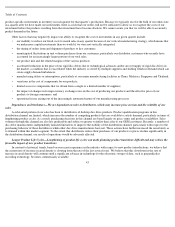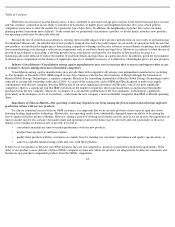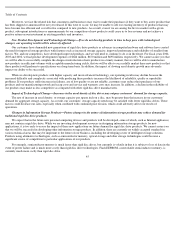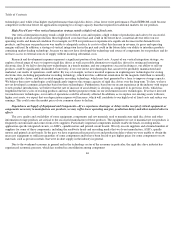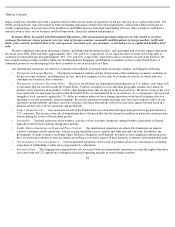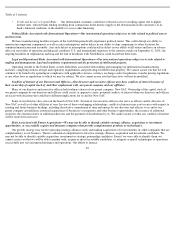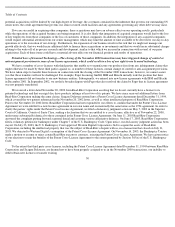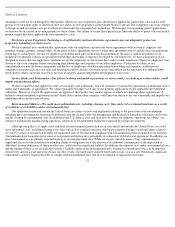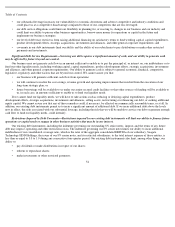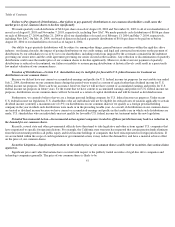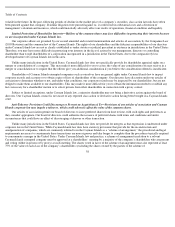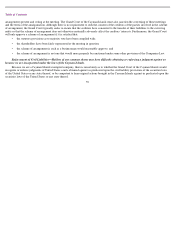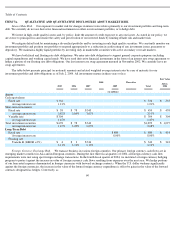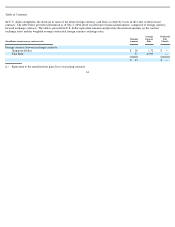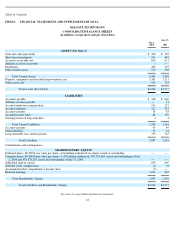Seagate 2003 Annual Report Download - page 54
Download and view the complete annual report
Please find page 54 of the 2003 Seagate annual report below. You can navigate through the pages in the report by either clicking on the pages listed below, or by using the keyword search tool below to find specific information within the annual report.
Table of Contents
Dependence on Key Personnel—The loss of some key executive officers and employees could negatively impact our business
prospects.
Our future performance depends to a significant degree upon the continued service of key members of management as well as marketing,
sales and product development personnel. The loss of one or more of our key personnel would have a material adverse effect on our business,
operating results and financial condition. We believe our future success will also depend in large part upon our ability to attract, retain and
further motivate highly skilled management, marketing, sales and product development personnel. A significant portion of the incentive
compensation for our senior management vested in calendar year 2003 and substantially all of this compensation will have vested by
November 2004. We may not be able to provide our senior management with adequate additional incentives to remain employed by us after
this time. We have experienced intense competition for personnel, and we cannot assure you that we will be able to retain our key employees or
that we will be successful in attracting, assimilating and retaining personnel in the future.
System Failures—
System failures caused by events beyond our control could adversely affect computer equipment and electronic data
on which our operations depend.
Our operations are dependent upon our ability to protect our computer equipment and the information stored in our databases from
damage by, among other things, earthquake, fire, natural disaster, power loss, telecommunications failures, unauthorized intrusion and other
catastrophic events. As our operations become more automated and increasingly interdependent, our exposure to the risks posed by these types
of events will increase. A significant part of our operations is based in an area of California that has experienced power outages and
earthquakes and is considered seismically active. We do not have a contingency plan for addressing the kinds of events referred to in this
paragraph that would be sufficient to prevent system failures and other interruptions in our operations that could have a material adverse effect
on our business, results of operations and financial condition.
Potential Tax Legislation—Negative publicity about companies located in certain offshore jurisdictions may lead to new legislation
that could increase our tax burden.
Several members of the United States Congress have introduced legislation relating to the U.S. federal tax treatment of U.S. companies
that have undertaken certain types of expatriation transactions. While we do not believe that this legislation, as currently proposed, would
adversely affect us, the exact scope of the legislation and whether it will ultimately be enacted is unclear at this time. In addition, certain state
legislatures have proposed similar legislation. Therefore, it is possible that federal or state legislation in this area, if enacted, could materially
increase our future tax burden or otherwise affect our business.
Risks Related to Our Substantial Indebtedness
Substantial Leverage—Our substantial leverage may place us at a competitive disadvantage in our industry.
We are leveraged and have significant debt service obligations. Our significant debt and debt service requirements could adversely affect
our ability to operate our business and may limit our ability to take advantage of potential business opportunities. For example, our high level
of debt presents the following risks to you:
•
we are required to use a substantial portion of our cash flow from operations to pay principal and interest on our debt, thereby
reducing the availability of our cash flow to fund working capital, capital expenditures, product development efforts, strategic
acquisitions, investments and alliances and other general corporate requirements;
53
•
our interest expense could increase if prevailing interest rates increase, because a substantial portion of our debt bears interest at
floating rates;


